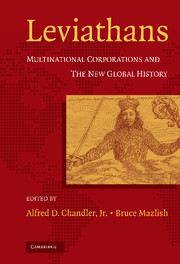Book contents
- Frontmatter
- Contents
- List of Figures and Tables
- Acknowledgments
- List of Contributors
- Introduction
- PART ONE THE SCOPE OF THE MULTINATIONAL PHENOMENON
- PART TWO CULTURAL AND SOCIAL IMPLICATIONS OF MULTINATIONALS
- 5 The Social Impacts of Multinational Corporations: An Outline of the Issues with a Focus on Workers
- 6 A Global Elite?
- PART THREE THE GOVERNANCE OF MULTINATIONALS
- Conclusion
- Index
6 - A Global Elite?
Published online by Cambridge University Press: 17 August 2009
- Frontmatter
- Contents
- List of Figures and Tables
- Acknowledgments
- List of Contributors
- Introduction
- PART ONE THE SCOPE OF THE MULTINATIONAL PHENOMENON
- PART TWO CULTURAL AND SOCIAL IMPLICATIONS OF MULTINATIONALS
- 5 The Social Impacts of Multinational Corporations: An Outline of the Issues with a Focus on Workers
- 6 A Global Elite?
- PART THREE THE GOVERNANCE OF MULTINATIONALS
- Conclusion
- Index
Summary
It is both interesting and important to reflect upon whether any individuals or network of individuals and groups can be seen as running the world and, if so, who they are and what are they up to. Within the context of global economy we ask these questions: Is there a global elite? Who runs the multinational corporations (MNCs) and other global institutions? In what kind of historical perspective should any such global elite be seen and how can research answer these questions? Also, what normative questions, if any, should be applied to the behavior of any global elite whose existence has been confirmed?
EARLY CONCEPTS OF AN ELITE CLASS
“Elite,” according to a standard dictionary, denotes a “socially superior group.” The word comes from the Latin eligere, which means “to choose.” Thus, the elite is the “choice part” of the body politic. It can refer to a social group of any size or dimension: a high school can have an elite class and so can a nation. In identifying a global elite, it is useful and perhaps necessary, as Peter Dobkin Hall argues, “to go beyond examining traditional economic and political elites” of the sort studied by previous scholars.
Information
- Type
- Chapter
- Information
- LeviathansMultinational Corporations and the New Global History, pp. 167 - 186Publisher: Cambridge University PressPrint publication year: 2005
Accessibility standard: Unknown
- 9
- Cited by
